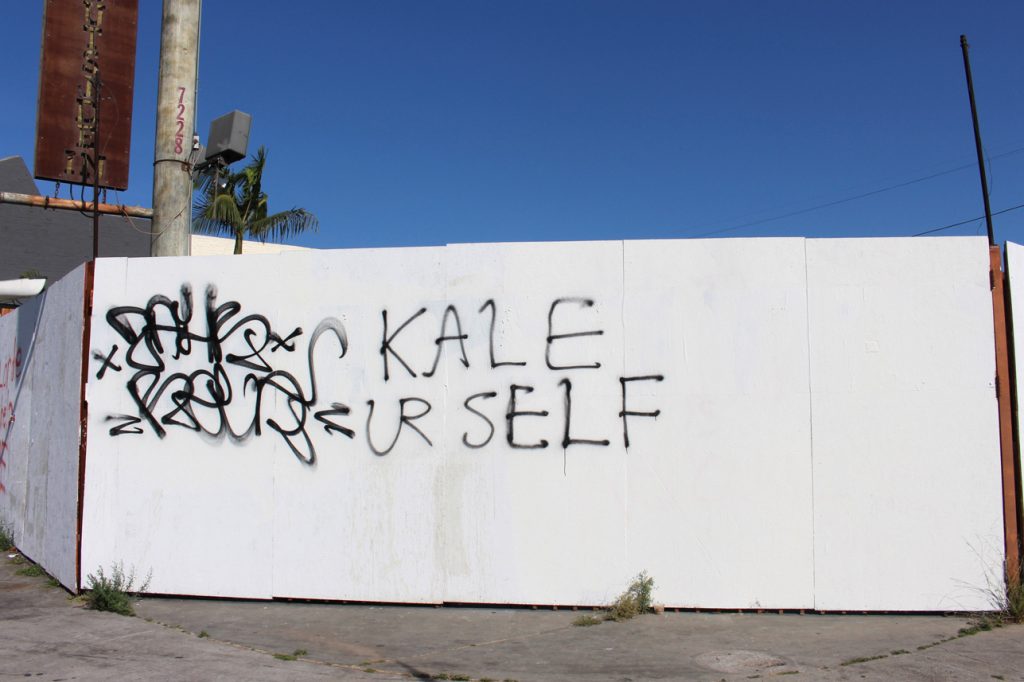Owner of the world’s first 24-hour vegan drive thru, which opened in London recently, have been the victim of anti-vegan graffiti.
Globally Local was targeted by vandals sometime between Thursday night (23rd June) and Friday morning (24th June). The perpetrators sprayed I [heart] meat on the property.
James McInnes, owner of the fast food restaurant, has said that this isn’t the first time his business has been vandalised but this is the first time the graffiti specifically targeted veganism.

So often vegans are accused of shoving their message down people’s throats. Vegan activism has a bad reputation for being aggressive, invasive and insulting but this is an example of non-vegans acting in exactly the same way.
Are both sides as bad as each other?
Recently the self named ‘Vegan Vandals’ left messages in a Hertfordshire nature reserve attempting to promote veganism. They used marker pens to write on the information plaques and were even careful not to cover up any of the other writing or indeed the map, presumably so as not to inconvenience anyone. The Vandals asked ‘Do you love animals? Then why do you eat them!’ and provided a helpful list of dairy alternatives to help people stop drinking milk.

To surmise, non-vegans decided to vandalise a small business simply for existing, and vegans decided to take advantage of the fact that most people reading that sign anyway would be animal lovers and force them to consider their lifestyle choices. Undeniably both sets of people caused damage which equates to lost money and time for both property owners but can we really see these actions as being equally aggressive?
Of course neither of these are examples of the most aggressive vegans and non-vegans can be on the subject of animal product consumption, but as similar acts, the comparison seems fair.
Additionally, when you start to consider why behaviour openly promoting veganism is seen as aggressive, it seems non-vegans arguments may start to fall apart.
In 2013 Cristina Odone wrote an article for The Telegraph voicing her concerns over the ways in which vegans use violence, and how it actually reduces the chances of her personally ceasing to eat meat. She was referring to a ‘human branding’ display taking place on the streets of London.

Willing volunteers were to be branded by a hot iron to protest the ways in which animals are treated in the animal agriculture industry. She described the activism as intimidating to the public and self righteous commenting ‘Surely there’s something criminal in forcing the public — innocent passers-by, whether resolute vegan or lifelong carnivores — to witness an act of violence on their way to the office or the shops?’
In a similarly public and forceful act of aggression, last year a Georgian far-right group stormed a vegan restaurant whilst eating meat and throwing meat at diners, putting it on their plates.
The problem here is that no-one was really forcing Odone to walk past this display, she knew about it ahead of time. But the reality is that her decision to eat meat does in fact force animals to go through that same painful experience, an experience she just couldn’t bare the thought of watching, on a daily basis.
Surely there’s something criminal in forcing animals to undergo that?

The vegans who were victimised in Georgia were not forcing anyone to do anything, they were simply enjoying a meal where they had chosen not to consume animal products but non-vegans were trying to force meat, and their life choices, onto the vegans.
Considering the word aggression is a synonym for forcefulness it seems clear which group of people might be deemed the more aggressive ones.
Image Credits: CBC | FarmLife LA | Animal Liberation Front


